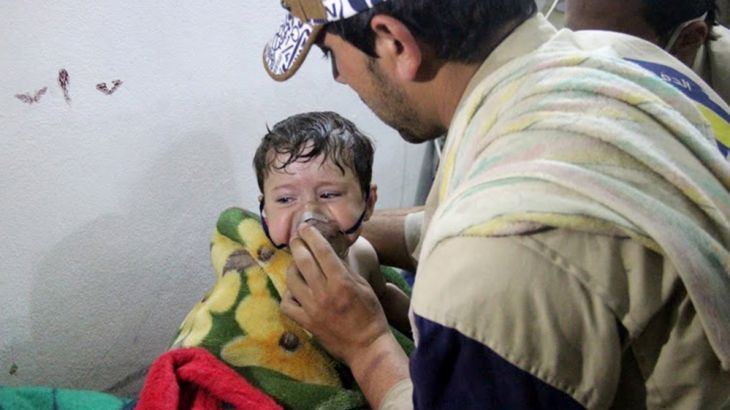Syrians recount horror of chemical attacks on civilians
Medical personnel tell US Congress that government forces using chlorine gas on civilians and urge for no-fly zone.

Aid workers and medical personnel have called on the US to take action against use of weaponised chlorine gas on civilians in Syria and to impose a no-fly zone in the wake of a series of gas attacks since March.
Testifying before the US Congress on Wednesday, the doctors who have worked in Syria called on the administration of US President Barack Obama to make good on its word to punish the government for the use of chemical weapons and put in place a no-fly zone to protect civilians.
“I live in Syria and I never see these helicopters and airplanes against extremists or training camps and so on. All we see is these planes and helicopters being used against hospitals, against schools,” Dr Mohamed Tennari from the Syrian-American Medical Society said.
|
|
Dr Tennari, who runs a field hospital in Idlib, one of the areas locals say has been most heavily hit with chlorine, told lawmakers that President Bashar al-Assad has concentrated his resources on civilians.
He described the night of March 16, when a wave of explosive barrel bombs were dropped from helicopters over his home town of Sarmin, filling the air with “a bleach-like odour”.
“Dozens of people experienced difficulty breathing, with their eyes and throats burning, and many began secreting from the mouth,” he said, speaking through a translator.
The doctors admit there is no way to 100 percent verify that the Syrian government is behind the attacks. But, they say, only the Syrian government has access to helicopters, responsible for dropping the chlorine filled barrels onto civilian areas it believes are supportive of the Syrian opposition.
“I am a doctor and I am very familiar with death but I have never seen a more obscene way to kill children. I have never watched so many suffer in such an obscene manner,” Dr Annie Sparrow, deputy director for Human Rights programme said.
Government forces have consistently targeted opposition areas with the goal of both prolonging suffering and driving them out of the area, Farouq Habib, the Syria programme manager for Mayday Rescue told the Congress.
On Tuesday, the Syrian government used so-called elephant rockets in an attack on the Damascus suburb of Douma, killing at least 36 people, including children, according to activists.
While the Syrian government has handed over its stocks of chemical weapons for destruction by the international community, chlorine does not count as a banned material because it has many uses, such as purifying water.
![Men search for survivors at a site hit by what activists said was heavy shelling by the Syrian government on Douma [Reuters]](/wp-content/uploads/2015/06/2384a1c6064f4228bb627b5c70285402_18.jpeg)
“The Syrian government is using chlorine gas with impunity,” the former US ambassador to Syria, Robert Ford, told the House foreign affairs committee.
President Assad has denied being behind the chlorine gas attacks even as up to 45 attacks have been reported since March.
Despite a UN resolution outlawing chlorine gas attacks, Ford said that Assad, fighting a four-year civil war to oust him, is not deterred.
The Organisation for the Prohibition of Chemical Weapons (OPCW) has been investigating allegations of dozens of recent gas attacks, but it is being refused access to the sites by Assad’s government, diplomatic sources have said.
Some Western powers have expressed concern that enforcing a no-fly zone in the area could empower ISIL fighters.
OPINION: Chlorine – Weapon of the desperate
In 2013, the US threatened military intervention against Syria’s government after sarin gas attacks killed hundreds of people in a Damascus suburb.
Assad’s government last year handed over 1,300 tonnes of chemical arms to a joint UN-OPCW mission for destruction. But Damascus has denied using sarin or any chemical weapons in battle during Syria’s continuing civil war.
The UK-based Syrian Observatory for Human Rights, with a network of sources on the ground, says it has documented 230,000 deaths in Syria’s war, almost 70,000 of them civilians.
![Infographic: Syria: A Country Divided [Al Jazeera]](/wp-content/uploads/2015/09/412b24ead10a43f0aae365d7bbda1809_18.jpeg)